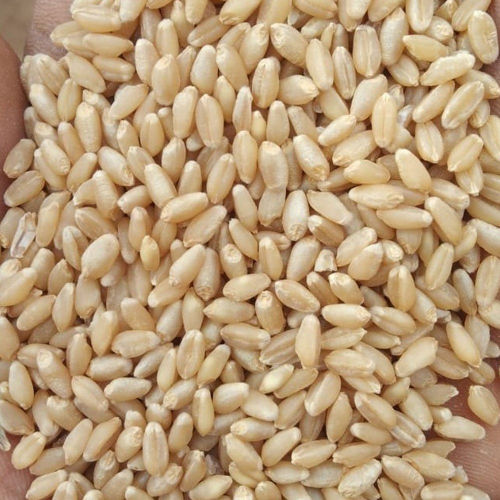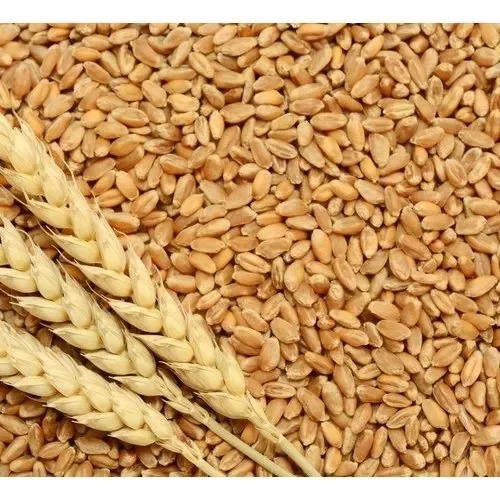M.P. Poorna (cross) Tukdi
Price 145 INR/ Kilograms
MOQ : 24000 Kilograms
M.P. Poorna (cross) Tukdi Specification
- Shelf Life
- 12 Months
- Processing Type
- Cleaned & Graded
- Style
- Natural
- Grade
- Premium
- Purity
- 99%
- Preserving Compound
- Natural
- Imperfect Ratio (%)
- Below 0.2%
- Wheat Type
- Hard wheat
- Variety
- Poorna (Cross) Tukdi
- Dried
- Yes
- Drying Method
- Sun Dried
- Physical Form
- Whole grain
- Moisture (%)
- Max 12%
- Foreign Particle (%)
- Max 0.1%
- Broken (%)
- Max 1.5%
- Color
- Light Brown
- Cultivation Type
- Common
M.P. Poorna (cross) Tukdi Trade Information
- Minimum Order Quantity
- 24000 Kilograms
- Supply Ability
- 50000 Kilograms Per Month
- Delivery Time
- 1 Week
- Main Domestic Market
- All India
About M.P. Poorna (cross) Tukdi
M.P. Poorna (cross) Tukdi is a type of finger millet or ragi variety that is commonly grown in the Madhya Pradesh region of India. Heres a brief description:
Physical Characteristics
- Color: Dark brown or reddish-brown
- Grain size: Small, approximately 1.5-2.5 mm in diameter
- Shape: Oval or elliptical
- Texture: Slightly rough
Nutritional Value
- High in calcium, iron, and fiber
- Good source of protein, potassium, and vitamins
- Rich in antioxidants and phytochemicals
- Gluten-free, making it suitable for people with gluten intolerance or celiac disease
Culinary Uses
- Commonly used in traditional Indian cuisine, particularly in the Madhya Pradesh region
- Can be cooked as a porridge, used in soups, stews, or as a side dish
- Can be ground into flour for baking or making traditional flatbreads
Health Benefits
- High fiber content can help lower cholesterol and regulate blood sugar levels
- Rich in antioxidants, which can help protect against chronic diseases like heart disease, diabetes, and certain cancers
- Gluten-free, making it a good option for people with gluten-related disorders
Special Features
- M.P. Poorna (cross) Tukdi is a high-yielding variety of finger millet that is resistant to diseases and pests.
- It is a popular variety among farmers in the Madhya Pradesh region due to its high yield potential and adaptability to different soil types.
High Gluten Content for Superior Baking
This hard wheat variety is suitable for producing premium bakery items and flour with excellent elasticity and texture, thanks to its naturally high gluten content. Its nutty and sweet taste adds depth and a delicate aroma to finished products, making it a favored choice among professional bakers and millers.
Strict Quality and Purity Standards
Every batch is meticulously cleaned, graded, and processed to maintain 99% purity with maximum 0.1% foreign particles and 1.5% broken grains. These rigorous standards ensure consistency, food safety, and optimum performance in commercial food production and bakery applications.
Ideal Storage and Longevity
Packaged in durable PP bags and preserved with natural compounds, this wheat offers a long shelf life of up to 12 months. Store in a cool and dry place to maintain its freshness, nutritional value, and flavor, ensuring a steady supply for year-round use.
FAQs of M.P. Poorna (cross) Tukdi:
Q: How should M.P. Poorna (Cross) Tukdi wheat be stored to maintain quality?
A: It is best to store this wheat in a cool and dry place, away from direct sunlight and moisture, to preserve its freshness and prolong its shelf life up to 12 months.Q: What are the main applications of this wheat variety in the food industry?
A: M.P. Poorna (Cross) Tukdi wheat is primarily used in milling to produce high-quality flour for bakeries, food processing, and a range of food industry applications requiring robust gluten content.Q: When is the harvest period for M.P. Poorna (Cross) Tukdi wheat?
A: This variety is harvested during the Rabi season, which typically spans from late winter to early summer in India, depending on regional climate conditions.Q: Where is the M.P. Poorna (Cross) Tukdi variety sourced and processed?
A: The wheat is cultivated, sun-dried, cleaned, and graded in India, with production, export, and supply managed by leading manufacturers and exporters in the region.Q: What processes are used to ensure the purity and quality of this wheat?
A: The wheat undergoes advanced cleaning and grading, employing modern equipment to remove impurities. Maximum admixture is kept to 1% and foreign particles below 0.1%, ensuring premium quality.Q: How is this wheat beneficial for bakery and industrial use?
A: Its inherent high gluten content makes it ideal for creating doughs with superior elasticity and structure, providing excellent results for breads, baked goods, and other food industry products.Q: What steps are taken to ensure the product is free from insect damage?
A: The wheat is subjected to thorough inspection and natural preservation techniques to prevent insect damage, ensuring the grains remain in optimal condition with nil insect presence.

Tell us about your requirement

Price:
Quantity
Select Unit
- 50
- 100
- 200
- 250
- 500
- 1000+
Additional detail
Mobile number
Email


 Send Inquiry
Send Inquiry


 Send Inquiry
Send Inquiry Send SMS
Send SMS English
English Spanish
Spanish French
French German
German Italian
Italian Chinese (Simplified)
Chinese (Simplified) Japanese
Japanese Korean
Korean Arabic
Arabic Portuguese
Portuguese